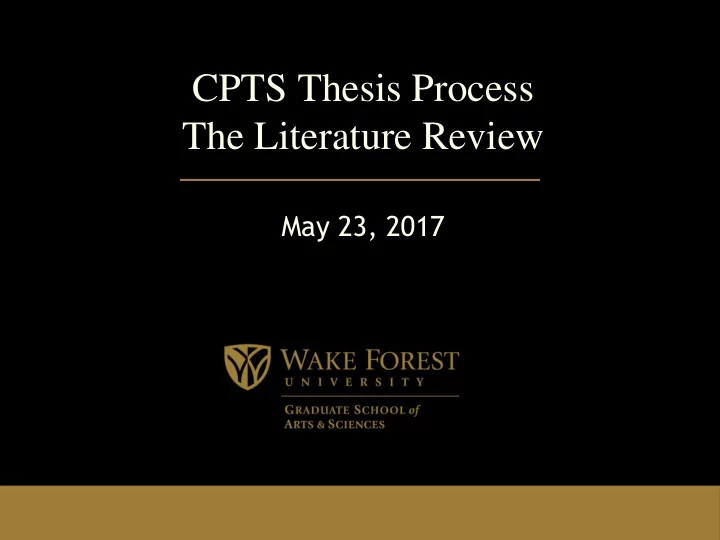

CPTS Thesis Process The Literature Review May 23, 2017
The Process of Research Research Involves a Process Formulate broad research question Literature review Refine the research question Place question in the context of literature or theory Decide on study design and methods Operationalize variables Observe Analyze Interpret Generalize back to broad questions
Literature Review - Overview 1. The purpose of the literature review is to gain an understanding of the existing research on a research topic and existing gaps in the body of knowledge on that topic. 2. The written literature search is a synthesis of these studies, with particular emphasis on: a. High quality studies (high impact journals) b. Systematic reviews/meta-analyses c. Clinical trials/longitudinal observational studies
Literature Search - Databases Hierarchy of Evidence
Literature Search - Databases 1. Research literature databases are the best places to start your search a. Medline/PubMed b. Google Docs c. EMBASE d. Cochrane Library http://researchguides.uic.edu/publichealth 2. Our medical center has subscriptions to many of the journals that you will be accessing, but if you cannot get the full text of an article, let us know
Literature Search – PubMed Database Example
Literature Search – Translating Research into Practice (TRIP) Example http://www.tripdatabase.com/
Literature Search – Search Terms
Literature Review – Search Terms 1. Make sure you use precise search terms. You can also narrow your search based on the time frame, or the type of study 2. You can use combinations of terms to narrow your search 3. The Carpenter Library staff can help if you need assistance
Literature Review – Helpful Tips 1. Talk with your thesis advisor during the process of identifying key papers 2. Visit the websites of key journal that are prominent in your field 3. Make sure you look over the citation list of papers that you review to find additional papers that may have been missed during the database search 4. Keeping a table or a database (e.g., RefMan) can help you organize your work
Literature Review – Helpful Tips Common Column Headings for Evidence Tables Publication Information (first author, journal, year, volume, page numbers Objectives Design Setting Participants, and group(s) Outcomes Key Exposures Primary Findings Strengths Limitations Relevance to your proposed work
Literature Review – Helpful Tips IMRAD Format I ntroduction (rationale for research) M ethods and Materials (how research was conducted, analysis plans) R esults (what was found) A nd D iscussion (interpretations, linking to previous results) IMRAD is appropriate to for reporting results of many types of manuscripts Perhaps not as applicable to field reports, case studies
Literature Review – Helpful Tips Example: Skelton, Irby, Giovanni: Family-Based Interventions to Treat Pediatric Obesity Worksheet to track searches Courtesy of Courtney Giannini
Literature Review – Writing the Review 1. Develop an outline of the topics you want to cover in your review 2. Compile the articles within each section of the review (there will be some overlap) 3. Collate information as much as possible (e.g., state a particular point, the cite all of the articles that affirm that point) 4. Make sure you cite any relevant statements in your review
Literature Review – Writing Your Review 1. For your thesis, the literature review will be a significant component of the first chapter. a. Introduction/Problem statement b. Literature Review c. Aims/Research questions 2. You will also do a literature review in Chapter 2 that will be much shorter and will be included in the Introduction and Discussion sections of your paper. 3. You may also consider using this opportunity to publish your literature review if one doesn’t exist on the topic.
Literature Review: For Our Next Meeting (June 20) 1. Provide an outline of your literature review 2. Provide a list of some key papers that you have identified for each section of your literature review 3. Provide a draft of the written literature review for our June 20 th meeting 4. Turn in your Approval for Thesis Committee Form
Recommend
More recommend